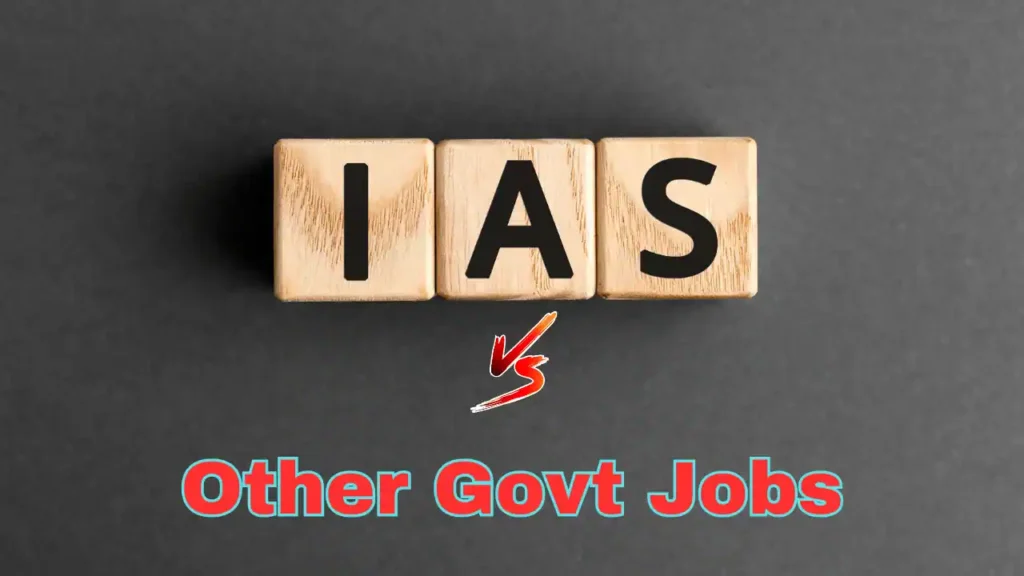Which Government Jobs Are More Powerful Than IAS: The Indian Administrative Service (IAS) occupies an esteemed position within the Indian bureaucratic framework. It serves as a beacon of aspiration for ambitious individuals drawn to the prospect of wielding influence over policy and development. However, the scope of Indian governance transcends the boundaries of the IAS, encompassing a spectrum of roles that command considerable authority in diverse arenas.
This article seeks to explore positions that may be perceived as possessing greater power or influence when compared to the IAS. It acknowledges the subjective nature of such comparisons and the inherent disparities like power across various roles.
Which Government Jobs Are More Powerful Than IAS
Positions Potentially Considered More Powerful:
1. The Judiciary:
Judges, particularly those in the higher judiciary such as the Supreme Court and High Courts, wield significant power. Their rulings can shape policy, nullify unconstitutional government actions, and impact the lives of millions. Operating independently of the executive branch, they ensure that their judgments are grounded in the law, free from political influence.
Comparison to IAS: While IAS officers are involved in policy formulation and implementation, judges play a pivotal role in interpreting and upholding the law. Their authority lies in adjudication rather than direct policy execution.

2. Chief of the Defence Staff (CDS):
The CDS leads the Indian Armed Forces, overseeing the army, navy, and air force. They bear immense responsibility for national security and strategic decision-making, particularly during wartime or potential conflicts.
Comparison to IAS: While the IAS focuses on civilian administration, the CDS leads the armed forces. Though both roles are vital, their power structures differ significantly.
3. Election Commission of India (ECI):
As an autonomous constitutional body, the ECI is tasked with conducting free and fair elections in India, the world’s largest democracy. It holds significant sway in ensuring equitable political participation and upholding the integrity of the electoral process.
Comparison to IAS: While the IAS plays a crucial role in governance, the ECI’s power is specifically vested in organizing elections, a cornerstone of Indian democracy.
4. Reserve Bank of India (RBI) Governor:
The RBI Governor heads the country’s central bank, exerting influence over critical economic aspects such as interest rates, monetary policy, and banking regulations. Their decisions can have far-reaching implications on inflation, economic growth, and financial stability.
Comparison to IAS: While the IAS focuses on administrative functions, the RBI Governor shapes the economic landscape through monetary policy.
5. Cabinet Ministers:
Ministers wield significant political power within the government, steering policy decisions and influencing legislation. They helm various ministries and departments, overseeing specific sectors and exercising authority over budget allocations and departmental operations.
Comparison to IAS: While IAS officers execute policies, ministers possess the authority to formulate and prioritize them. However, it is essential to note that ministers are ultimately accountable to parliament and the electorate.
Read Also: List of TNPSC Exams and Qualifications
Govt Jobs Have More Salary Than IAS
While the Indian Administrative Service (IAS) is one of the most prestigious government positions in India, several other government jobs offer comparable or even higher salaries. Here are a few examples:
Indian Foreign Service (IFS):
The Indian Foreign Service is another elite civil service that offers competitive salaries, allowances, and benefits comparable to the IAS. IFS officers are responsible for representing India’s interests abroad, engaging in diplomatic relations, and negotiating international treaties. Their salaries are determined by the Pay Commission recommendations and are often on par with those of IAS officers.
Indian Police Service (IPS):
IPS officers are responsible for maintaining law and order, preventing and investigating crimes, and ensuring internal security. They receive salaries and allowances similar to those of IAS officers, as their roles are critical in maintaining the country’s security and stability.
Indian Revenue Service (IRS):
The Indian Revenue Service is responsible for administering and enforcing tax laws in India. IRS officers are tasked with collecting taxes, preventing tax evasion, and ensuring compliance with tax regulations. They receive salaries and benefits comparable to those of IAS officers, as their roles are crucial for the government’s revenue generation efforts.
Defence Services:
Officers in the Indian Army, Navy, and Air Force also receive competitive salaries and benefits. They are responsible for defending the country’s borders, safeguarding its interests, and ensuring national security. While the salary structure may vary slightly from that of civilian services, defence officers often enjoy additional perks such as housing allowances, medical benefits, and retirement benefits.
Public Sector Undertakings (PSUs):
Many public sector undertakings, such as Bharat Petroleum, Oil and Natural Gas Corporation (ONGC), and Steel Authority of India Limited (SAIL), offer attractive salaries and benefits to their employees. While these positions may not be part of the civil services, they often provide salaries that are competitive with those of IAS officers, particularly for senior management positions.
Overall, while the IAS is widely regarded as one of the most prestigious government jobs in India, there are several other government positions and sectors that offer comparable or even higher salaries and benefits.

Important Considerations:
1. Nature of Power: Power dynamics within government are multifaceted and extend beyond mere hierarchical structures. While some positions wield formal authority bestowed by their designation, others derive influence from various sources such as expertise, public perception, or the ability to shape public discourse.
For instance, while a judge in the judiciary may have the authority to interpret laws and deliver verdicts, a civil society leader may exert influence through grassroots activism and community mobilization. Understanding the nuanced nature of power is crucial in comprehending the dynamics of governance and decision-making.
2. The Focus of the Role: Comparing roles across diverse domains like the judiciary, military, and economy is inherently challenging due to the distinct functions they serve and the nature of power they wield within their respective spheres. Each domain operates within its own set of rules, norms, and objectives, making direct comparisons difficult.
For example, while the judiciary focuses on adjudicating legal disputes and upholding the rule of law, the military prioritizes national defence and security. Similarly, the economic domain revolves around fiscal policies, market dynamics, and wealth distribution. Recognizing these inherent differences is essential in evaluating the significance and impact of various government positions.
3. Individual Leadership: Effective leadership transcends formal designations and titles, playing a pivotal role in shaping outcomes and driving change. Irrespective of one’s formal designation, individual capabilities and leadership qualities can significantly enhance the impact and influence of any position. A leader’s vision, integrity, and ability to inspire and motivate others are critical factors in determining their effectiveness.
For instance, a proactive and visionary bureaucrat may spearhead innovative reforms within their department, while a charismatic political leader may rally public support for policy initiatives. By emphasizing individual leadership qualities, organizations can cultivate a culture of excellence and innovation, fostering positive outcomes and sustainable progress.
What Powers Does an IAS Officer Have
Indian Administrative Service (IAS) officers hold significant powers and responsibilities in the Indian government. Here are some of the key powers and roles of an IAS officer:
- Policy Formulation and Implementation: IAS officers play a crucial role in formulating and implementing government policies at the district, state, and national levels. They work closely with other government departments and stakeholders to design policies that address various social, economic, and administrative issues.
- Administrative Leadership: IAS officers are responsible for the efficient administration of government departments and agencies. They oversee the functioning of government offices, ensure compliance with laws and regulations, and provide leadership to subordinate staff.
- District Administration: At the district level, IAS officers serve as District Magistrates or Deputy Commissioners and are responsible for overall administration and governance. They manage law and order, oversee development projects, and coordinate with other government agencies to address local issues.
- Revenue Administration: IAS officers are responsible for revenue administration in their respective districts. They supervise the collection of taxes, land revenue, and other government dues, and ensure proper management of government land and property.
- Judicial Powers: IAS officers serving as District Magistrates have judicial powers to enforce law and order, maintain public peace, and adjudicate certain cases under their jurisdiction. They can issue orders, impose fines, and take other necessary actions to uphold law and order.
- Development Initiatives: IAS officers play a key role in planning and implementing development initiatives and welfare programs. They work to improve infrastructure, promote economic development, and address social welfare issues such as education, healthcare, and poverty alleviation.
- Representation: IAS officers represent the government and act as liaisons between the government and the public. They interact with elected representatives, community leaders, and other stakeholders to understand public concerns and facilitate government interventions.
- Policy Advice: IAS officers provide valuable advice and recommendations to government policymakers based on their expertise and experience. They conduct research, analyze data, and offer insights to help policymakers make informed decisions on various issues.
- Crisis Management: During emergencies and natural disasters, IAS officers play a crucial role in coordinating relief and rescue operations, ensuring the safety and well-being of citizens, and restoring normalcy in affected areas.
Overall, IAS officers wield significant administrative, executive, and decision-making powers, enabling them to effectively serve the government and the public in various capacities.
The lowest rank in IAS
The lowest rank in the Indian Administrative Service (IAS) is that of a Probationary Officer or Assistant Collector. Newly recruited officers enter the service at this level after successfully completing the IAS probationary period, which typically lasts for two years. During this probationary period, they undergo training and gain practical experience in various aspects of administration and governance. Upon completion of the probationary period, they are confirmed in the service and may be assigned to different roles and responsibilities based on their performance and preferences.
Read Also: How Can I Study for TNPSC at Home
The Indian governance framework offers a multitude of positions with significant power and influence. While the IAS occupies a prominent position, exploring alternative avenues can lead to impactful careers contributing to national development and societal well-being. Recognizing the unique nature of power within each role fosters a deeper understanding of the intricate power dynamics shaping Indian governance.
